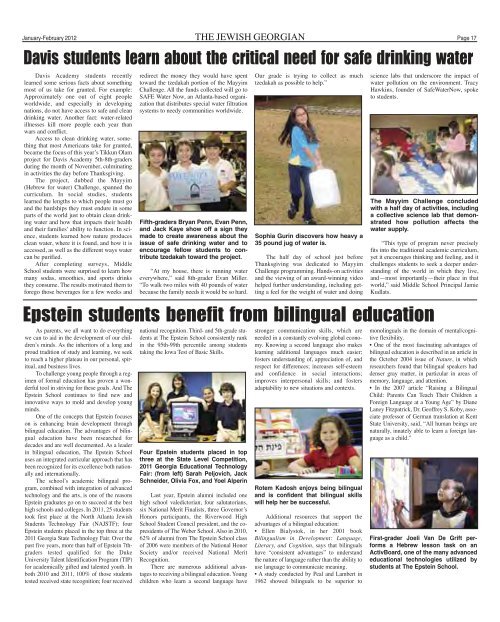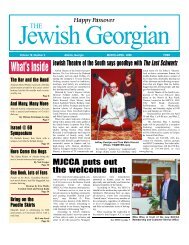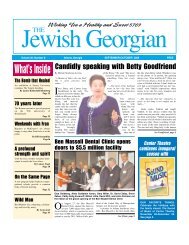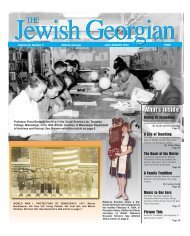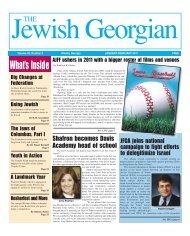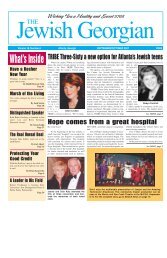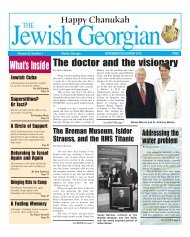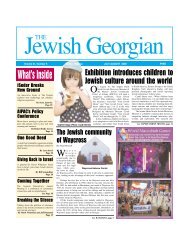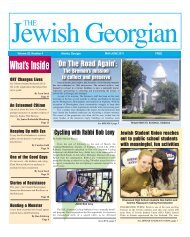January-February 2012 - The Jewish Georgian
January-February 2012 - The Jewish Georgian
January-February 2012 - The Jewish Georgian
You also want an ePaper? Increase the reach of your titles
YUMPU automatically turns print PDFs into web optimized ePapers that Google loves.
<strong>January</strong>-<strong>February</strong> <strong>2012</strong> THE JEWISH GEORGIAN Page 17<br />
Davis students learn about the critical need for safe drinking water<br />
Davis Academy students recently<br />
learned some serious facts about something<br />
most of us take for granted. For example:<br />
Approximately one out of eight people<br />
worldwide, and especially in developing<br />
nations, do not have access to safe and clean<br />
drinking water. Another fact: water-related<br />
illnesses kill more people each year than<br />
wars and conflict.<br />
Access to clean drinking water, something<br />
that most Americans take for granted,<br />
became the focus of this year’s Tikkun Olam<br />
project for Davis Academy 5th-8th-graders<br />
during the month of November, culminating<br />
in activities the day before Thanksgiving.<br />
<strong>The</strong> project, dubbed the Mayyim<br />
(Hebrew for water) Challenge, spanned the<br />
curriculum. In social studies, students<br />
learned the lengths to which people must go<br />
and the hardships they must endure in some<br />
parts of the world just to obtain clean drinking<br />
water and how that impacts their health<br />
and their families’ ability to function. In science,<br />
students learned how nature produces<br />
clean water, where it is found, and how it is<br />
accessed, as well as the different ways water<br />
can be purified.<br />
After completing surveys, Middle<br />
School students were surprised to learn how<br />
many sodas, smoothies, and sports drinks<br />
they consume. <strong>The</strong> results motivated them to<br />
forego those beverages for a few weeks and<br />
As parents, we all want to do everything<br />
we can to aid in the development of our children’s<br />
minds. As the inheritors of a long and<br />
proud tradition of study and learning, we seek<br />
to reach a higher plateau in our personal, spiritual,<br />
and business lives.<br />
To challenge young people through a regimen<br />
of formal education has proven a wonderful<br />
tool in striving for these goals. And <strong>The</strong><br />
Epstein School continues to find new and<br />
innovative ways to mold and develop young<br />
minds.<br />
One of the concepts that Epstein focuses<br />
on is enhancing brain development through<br />
bilingual education. <strong>The</strong> advantages of bilingual<br />
education have been researched for<br />
decades and are well documented. As a leader<br />
in bilingual education, <strong>The</strong> Epstein School<br />
uses an integrated curricular approach that has<br />
been recognized for its excellence both nationally<br />
and internationally.<br />
<strong>The</strong> school’s academic bilingual program,<br />
combined with integration of advanced<br />
technology and the arts, is one of the reasons<br />
Epstein graduates go on to succeed at the best<br />
high schools and colleges. In 2011, 25 students<br />
took first place at the North Atlanta <strong>Jewish</strong><br />
Students Technology Fair (NAJSTF); four<br />
Epstein students placed in the top three at the<br />
2011 Georgia State Technology Fair. Over the<br />
past five years, more than half of Epstein 7thgraders<br />
tested qualified for the Duke<br />
University Talent Identification Program (TIP)<br />
for academically gifted and talented youth. In<br />
both 2010 and 2011, 100% of those students<br />
tested received state recognition; four received<br />
redirect the money they would have spent<br />
toward the tzedakah portion of the Mayyim<br />
Challenge. All the funds collected will go to<br />
SAFE Water Now, an Atlanta-based organization<br />
that distributes special water filtration<br />
systems to needy communities worldwide.<br />
Fifth-graders Bryan Penn, Evan Penn,<br />
and Jack Kaye show off a sign they<br />
made to create awareness about the<br />
issue of safe drinking water and to<br />
encourage fellow students to contribute<br />
tzedakah toward the project.<br />
“At my house, there is running water<br />
everywhere,” said 8th-grader Evan Miller.<br />
“To walk two miles with 40 pounds of water<br />
because the family needs it would be so hard.<br />
national recognition. Third- and 5th-grade students<br />
at <strong>The</strong> Epstein School consistently rank<br />
in the 95th-99th percentile among students<br />
taking the Iowa Test of Basic Skills.<br />
Four Epstein students placed in top<br />
three at the State Level Competition,<br />
2011 Georgia Educational Technology<br />
Fair: (from left) Sarah Peljovich, Jack<br />
Schneider, Olivia Fox, and Yoel Alperin<br />
Last year, Epstein alumni included one<br />
high school valedictorian, four salutatorians,<br />
six National Merit Finalists, three Governor’s<br />
Honors participants, the Riverwood High<br />
School Student Council president, and the copresidents<br />
of <strong>The</strong> Weber School. Also in 2010,<br />
62% of alumni from <strong>The</strong> Epstein School class<br />
of 2006 were members of the National Honor<br />
Society and/or received National Merit<br />
Recognition.<br />
<strong>The</strong>re are numerous additional advantages<br />
to receiving a bilingual education. Young<br />
children who learn a second language have<br />
Our grade is trying to collect as much<br />
tzedakah as possible to help.”<br />
Sophia Gurin discovers how heavy a<br />
35 pound jug of water is.<br />
<strong>The</strong> half day of school just before<br />
Thanksgiving was dedicated to Mayyim<br />
Challenge programming. Hands-on activities<br />
and the viewing of an award-winning video<br />
helped further understanding, including getting<br />
a feel for the weight of water and doing<br />
stronger communication skills, which are<br />
needed in a constantly evolving global economy.<br />
Knowing a second language also makes<br />
learning additional languages much easier;<br />
fosters understanding of, appreciation of, and<br />
respect for differences; increases self-esteem<br />
and confidence in social interactions;<br />
improves interpersonal skills; and fosters<br />
adaptability to new situations and contexts.<br />
Rotem Kadosh enjoys being bilingual<br />
and is confident that bilingual skills<br />
will help her be successful.<br />
Additional resources that support the<br />
advantages of a bilingual education:<br />
• Ellen Bialystok, in her 2001 book<br />
Bilingualism in Development: Language,<br />
Literacy, and Cognition, says that bilinguals<br />
have “consistent advantages” to understand<br />
the nature of language rather than the ability to<br />
use language to communicate meaning.<br />
• A study conducted by Peal and Lambert in<br />
1962 showed bilinguals to be superior to<br />
science labs that underscore the impact of<br />
water pollution on the environment. Tracy<br />
Hawkins, founder of SafeWaterNow, spoke<br />
to students.<br />
<strong>The</strong> Mayyim Challenge concluded<br />
with a half day of activities, including<br />
a collective science lab that demonstrated<br />
how pollution affects the<br />
water supply.<br />
“This type of program never precisely<br />
fits into the traditional academic curriculum,<br />
yet it encourages thinking and feeling, and it<br />
challenges students to seek a deeper understanding<br />
of the world in which they live,<br />
and—most importantly—their place in that<br />
world,” said Middle School Principal Jamie<br />
Kudlats.<br />
Epstein students benefit from bilingual education<br />
monolinguals in the domain of mental/cognitive<br />
flexibility.<br />
• One of the most fascinating advantages of<br />
bilingual education is described in an article in<br />
the October 2004 issue of Nature, in which<br />
researchers found that bilingual speakers had<br />
denser gray matter, in particular in areas of<br />
memory, language, and attention.<br />
• In the 2007 article “Raising a Bilingual<br />
Child: Parents Can Teach <strong>The</strong>ir Children a<br />
Foreign Language at a Young Age” by Diane<br />
Laney Fitzpatrick, Dr. Geoffrey S. Koby, associate<br />
professor of German translation at Kent<br />
State University, said, “All human beings are<br />
naturally, innately able to learn a foreign language<br />
as a child.”<br />
First-grader Joeli Van De Grift performs<br />
a Hebrew lesson task on an<br />
ActivBoard, one of the many advanced<br />
educational technologies utilized by<br />
students at <strong>The</strong> Epstein School.


